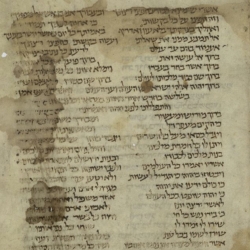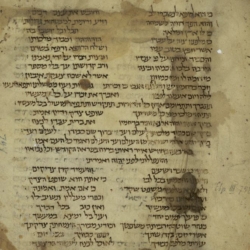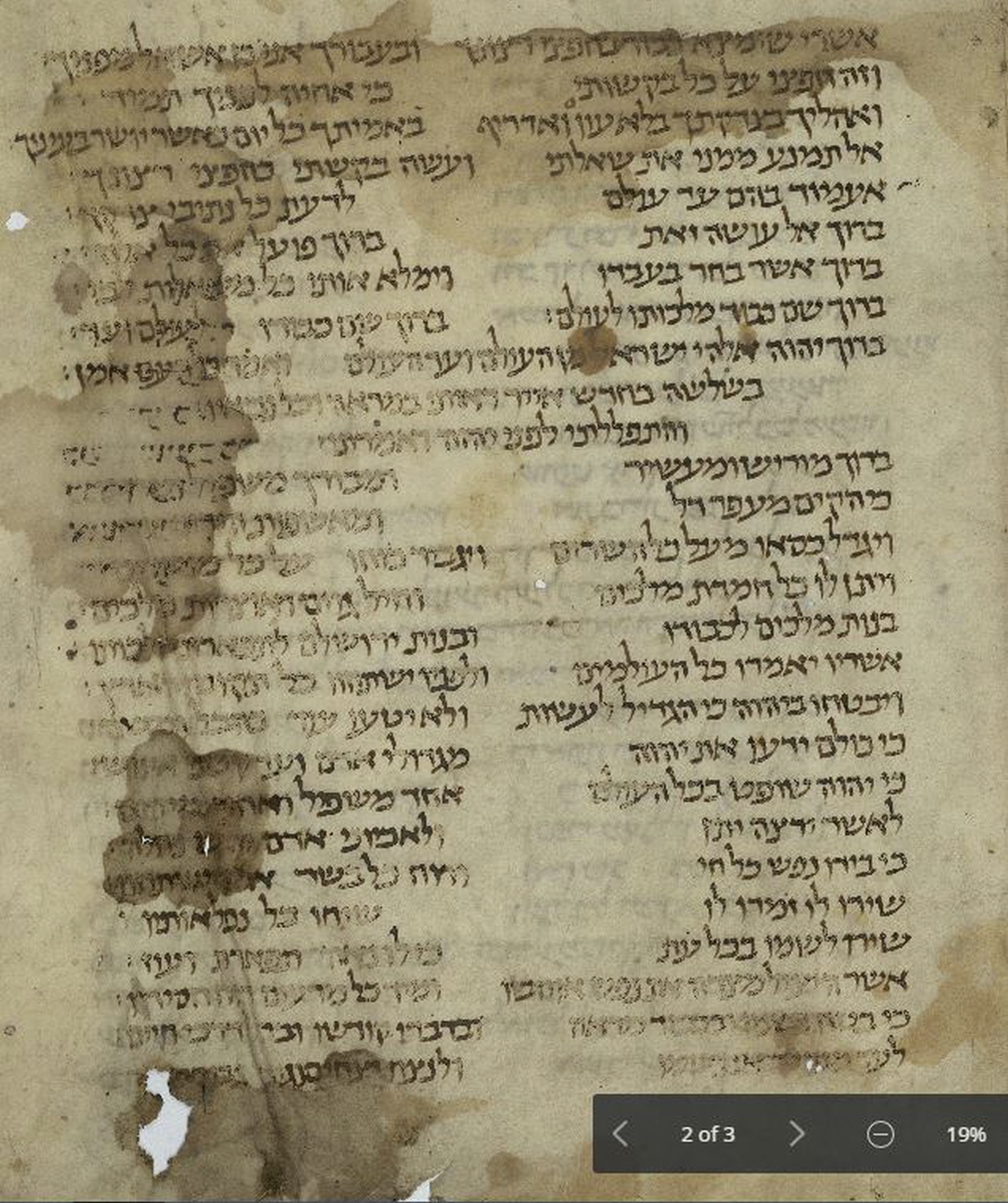Note: “The CAUSE” is used to translate the Divine Name YHVH, based on the philosophical idea of God as the Prime Mover and on the interpretation of the Name as a causative form of the copula – “causes to be.” This translation also uses the plural pronouns They/Their/Them to refer to God as a pluralis majestatis, and to avoid the implications of God being assigned a gender. (Find Ibn Ezra’s commentary on Genesis 1:1 for a discussion of the pluralis majestatis when referring to God.) All divine referents (pronouns, epithets, names) are rendered in unicase.
| Source (Hebrew) | Translation (English) |
|---|---|
|
בִּשְׁלֹשָׁה בְּחֹדֶשׁ אִיָּ֗ר
רָאִ֣יתִי בְ֭מַרְאֶֽה וְכׇל־נְבוּאָ֑יו וְהִתְפַּלַּ֗לְתִּי לִפְנֵ֥י יְ֝הֹוָ֗ה וְאָמַֽרְתִּי׃ |
On the third of the month of Iyyar
I looked into the sight and all Their prophecies, and I prayed before the Cause and said: |
|
בָּ֭רוּךְ מוֹרִ֣ישׁ וּמַעֲשִׁ֑יר
וּמְבֹרָךְ מַשְׁפִּיל וּמֵרִֽים׃ |
Blessed is the Impoverisher and Enricher,
and blessed be the Debaser and Exalter. |
|
כִּ֣י הֵ֭קִים מֵעָפָ֣ר דַּ֑ל
וּ֝מֵאַשְׁפּ֗וֹת הֵרִ֥ים אֶבְיֽוֹן׃ |
For They raised up the poor from the dust,
and from the midden lifted the impoverished.[1] Find Psalms 113:7, in past tense. |
|
וַיִּגְדַּ֣ל כִּ֭סְאוֹ מֵעַ֣ל כׇּל־הַשָּׂרִ֑ים
וַיַּגְבִּ֣יר כֹּח֖וֹ עַ֣ל כׇּל־מוֹשְׁלִֽים׃ |
And They made his throne over all princes,
and strengthened his might over all leaders. |
|
וַיִּתֵּן־ל֭וֹ כׇּל־חֶמְדַּ֣ת מְלָכִ֑ים
וְחֵ֥יל גּ֝וֹיִ֗ם וְאוֹצְר֥וֹת מְלָכִֽים׃ |
And They gave him all kingly desires,
and the wealth of nations and treasures of kings. |
|
בְּנ֣וֹת מְלָכִ֣ים לִכְבוֹד֑וֹ
וּבְנ֥וֹת יְ֝רוּשָׁלַ֗םִ לְתִפְאֶ֣רֶת מַלְכוּתֽוֹ׃ |
Daughters of kings as his glory,
and daughters of Jerusalem the splendor of his kingdom. |
|
אַשְׁרָ֨יו ׀ יֹ֭אמְרוּ כׇּל־הָעוֹלָמִ֑ים
וּלְפָנָ֥יו יִ֝שְׁתַּחֲו֗וּ כׇּל־תְּקוּמֵ֥י הָאָֽרֶץ׃ |
“Content is he!” all eternities say,
and before him all the earth’s forces will bow down. |
|
וְיִבְטְח֬וּ בַּיהֹוָ֗ה כִּ֣י הִגְדִּ֣יל לַעֲשׂ֑וֹת
וְ֝לֹא־יִטְעוּ־ע֗וֹד בְּהֶ֣בֶל וּמִשְׁגֶּֽה׃ |
And they will trust in the Cause for They acted greatly,
and will no longer stray in wasted breath and error. |
|
כִּי־כֻלָּ֣ם יֵדְע֣וּ אֶת־יְהֹוָ֖ה
מִגְּדוֹלֵ֥י אָדָ֖ם וְעַד־קְטַנֵּ֣י אֱנֽוֹשׁ׃ |
For they all will know the Cause
from the greatest of humans to the smallest of mortals. |
|
כִּ֤י ׀ יְהֹוָ֣ה שׁוֹפֵ֣ט בְּכׇל־הָעוֹלָ֑ם
אֶחָ֣ד מַשְׁפִּ֖יל וְאֶחָ֣ד מֵרִֽים׃ |
For the Cause is judge over all eternity,
debasing one, exalting another. |
|
לַאֲשֶׁ֣ר יִ֭רְצֶה יִתֵּ֑ן
וּלְאֶבְיוֹנֵ֥י אָ֝דָ֗ם יוֹרִ֥ישׁ[2] ירש כתיב נַחֲלָֽה׃ |
To those whom They desire They grant,
and to the poorest people bequeaths an inheritance. |
|
כִּ֣י בְּ֭יָדוֹ נֶ֣פֶשׁ כׇּל־חָ֑י
וְר֥וּחַ כׇּ֝ל־בָּשָׂ֗ר אֵלָ֥יו יִשְׁתַּחֲוֽוּ׃ |
For in Their hand is the breath of all life,
and the spirit of all flesh bows down to Them. |
|
שִֽׁירוּ־ל֭וֹ זַמְּרוּ־ל֑וֹ
שִׂ֝֗יחוּ כׇּל־נִפְלְאוֹתָֽיו׃ |
|
|
שִׁ֣ירוּ לִשְׁמ֣וֹ בְּכׇל־עֵ֑ת
כִּ֤י ל֥וֹ נָ֝אֶ֗ה תִּפְאֶ֥רֶת וָעֹֽז׃ |
Sing to Their name at all times,
for befitting Them is splendor and strength. |
|
אֲשֶׁ֬ר הִצִּ֗יל מִצָּרָה֮ אֶת־נֶ֪פֶשׁ א֫וֹהֲבָ֥ו
וּמִיָּ֣ד כׇּל־מְרֵעִ֑ים ר֣וּחַ חֲסִידָֽו׃ |
For They delivered from stress the breath of those who love Them,
and from the hand of all evildoers the spirit of Their pious ones. |
|
כִּ֗י בָּטַ֣ח בִּ֭שְׁמוֹ וּבִכְב֣וֹד מַרְאֶ֑ה
וּבְדִבְרֵ֥י קׇ֝דְשׁ֗וֹ וּבְכׇל־דַּרְכֵ֣י חַיִּֽים׃ |
For he trusted in Their name and in the glorious vision
and in Their holy words and in all the paths of life. |
|
לָעַ֣ד נַעֲבֹ֣ד אֶת־שְׁמ֑וֹ
וּלְנֶ֣צַח נְ֝צָחִ֗ים נַגִּ֥יד גְּבוּרָתֽוֹ׃ |
Forever we will worship Their name,
and to infinite infinites we will tell Their strength. |
|
כִּ֨י ה֣וּא ר֭וֹפֵא לְנִ֣שְׁבְּרֵי־לֵ֑ב
וְחוֹבֵ֖שׁ אֶת־עֶ֣צֶם דַּכִּֽים׃ |
For They heal the shattered-hearted,
and bind the bones of the crushed. |
|
וְה֗וּא הָפַ֣ךְ דְּ֭וִיָּה לְשִׂמְחָ֑ה
וְזִ֥יעַ וְ֝רָתִ֗ית לְמִבְטְח֥וֹת גְּדֹלֽוֹת׃ |
And They turn grief into joy,
and quaking and trembling into great confidence. |
|
כִּי־ל֭וֹ אֶ֣רֶץ וּמְלֹאָ֑הּ
תֵּ֝בֵ֗ל וְכׇל־י֥וֹשְׁבֵי בָּֽהּ׃ |
|
|
כִּ֣י מִ֭לְּפָנָיו צִוָּ֣ה עַל־עַבְדּ֑וֹ
ה֥וֹד וְהָדָ֖ר וּכְב֣וֹד מַלְכוּתֽוֹ׃ |
For from before Them, They commanded Their servant,
pomp and pageantry and Their glorious sovereignty. |
|
אֲשֶׁ֣ר חָ֭פֵץ בְּט֣וּב עַמּ֑וֹ
וְשָׁלַ֥ח הָ֝רוֹפֵ֗א וְרָפָ֥א בְּשָׂרָֽם׃ |
For They delight in the welfare of Their people,
and sent the healer and healed their flesh. |
|
וְהִכְבִּ֣יד תּ֭וֹרָתוֹ עַל־פִּ֣י עַבְדּ֑וֹ
וּמִצְוַ֥ת דְּ֝בָר֗וֹ עַל־יְדֵ֥י נֶאֱמָנֽוֹ׃ |
And glorified Their Teaching by the mouth of Their servant,
and Their word’s commandment by the hands of Their faithful one. |
|
הִרְבָּ֣ה בְּ֭לִבּוֹ חׇכְמָ֣ה וּבִינָ֑ה
וְרַ֥ב קְ֝דֻשָּׁת֗וֹ עַד־בְּלִי־מִסְפָּֽר׃ |
They increased wisdom and understanding in Their mind,[5] Lit. “heart.” The heart is seen in traditional Jewish texts as the seat of wisdom.
and Their holiness’ greatness is innumerable. |
|
מִי־דּֽוֹמֶה־ל֭וֹ וּמִ֣י כְּמוֹת֑וֹ
אֲשֶׁ֤ר לֹ֣א שָׁ֝כַ֗ח צַעֲקַ֥ת אֶבְיֽוֹן׃ |
Who can be compared to Them, and who is like Them,
who has not forgotten the cry of the impoverished? |
|
וְזָכַר בְּרַחֲמָיו֮ עָנִ֪י וָ֫דַ֥ל וְגַ֣ם אָ֭נֹכִי כִּי־זָכַ֣רְתִּי
גְּבוּר֑וֹת וְעֹ֥ז מֶ֝מְשַׁלְתּ֗וֹ וְתִפְאֶ֥רֶת עֻזּֽוֹ׃ |
And They remembered in Their mercy the needy and poor, and as for me I remembered
mighty acts and the strength of Their rule and the glory of Their strength.[6] The layout of this verse in the manuscript does not follow the parallelism of the syntax. This is reflected in the translation. |
|
לַ֣יְלָה וָ֭יוֹם אֶעֱמֹ֣ד לְפָנָ֑יו
וַאֲבָרֵ֥ךְ אֶ֝ת־זִכְר֗וֹ עַ֥ל כׇּל־מַעֲשָֽׂיו׃ |
Night and day I will stand before Them,
and I will bless Their moniker for all Their deeds. |
|
תִּתְבָּרֵ֣ךְ וְ֭תִתְרוֹמֵם אֲד֣וֹן כׇּל־הַדּוֹר֑וֹת
תִּתְקַדֵּ֥שׁ וְ֝תִתְפָּאֵ֗ר מוֹשֵׁ֥ל בְּכׇל־מַעֲשָֽׂיו׃ |
Blessed and exalted be the Master of all generations,
sanctified and sumptified the Leader in all Their acts. |
|
תִּתְיַחֵ֣ד מַ֭לְכִּי מִפִּ֣י כׇּל־מְשָׁרְתֶ֑ךָ
שׁוֹפֵ֥ט צֶ֖דֶק וְדַיָּ֣ן אֱמֶֽת׃ |
Unified be my Sovereign in the mouth of all who serve You,
Judge of right and Magistrate of truth. |
|
בָּר֬וּךְ אַתָּ֗ה יְ֘הֹוָ֥ה אֵ֣ל נָ֭א זוֹכֵ֣ר בְּרַחֲמָ֑יו
אֶת־בְּרִ֥ית עַ֝בְדּ֗וֹ לָנֶֽצַח׃ |
Blessed are You, Cause! May the Deity please remember in Their mercy
the covenant of Their servant forever.[7] The layout of this verse in the manuscript does not follow the parallelism of the syntax. This is reflected in the translation. |
|
בָּ֭רוּךְ שֵׁ֣ם כְּב֣וֹד מַלְכוּת֑וֹ לְ֝עוֹלָ֗ם וָעֶֽד׃
בָּ֭רוּךְ שֵׁ֣ם כְּבוֹד֑וֹ לְ֝עוֹלָ֗ם וְעַֽד׃ |
Blessed be the name of Their glorious majesty forever and aye![8] The last two lines of this psalm are written two verses to a line instead of one.
And blessed be Their glorious name forever and aye! |
|
בָּ֤רֽוּךְ־יְהֹוָ֨ה אֱלֹהֵ֪י יִשְׂרָאֵ֡ל מִן־הָ֤עוֹלָ֨ם ׀ וְעַ֬ד הָעוֹלָ֗ם
וְאָמַ֖ר כׇּל־הָעָ֥ם אָמֵֽן׃ |
Blessed be the Cause God of Israel from eternity until eternity,
and all the people said amen![9] Find Psalms 106:48 |
This is the third psalm found in MS RNL Antonin 798 in the Antonin Collection, St. Petersburg. A transcription and English translation of the work was most recently published in Has Psalm 156 Been Found? With Images of MS RNL Antonin 798 (2018) by James H. Charlesworth with the assistance of Brandon L. Allen. This vocalized and cantillated transcription and translation was made by Isaac Gantwerk Mayer. Most of the more recent scholarship considers the work to either be from the Qumran community (that produced the Dead Sea Scrolls) or from the same period and culture. Adding to his survey of scholarly opinion on the date and origin of the work, Charlesworth writes, “While I would like to affirm the hypothesis that the author of MS RNL Antonin 798 knew the Qumran Psalms Scroll, that conclusion has not been demonstrated; we can only be confident that the author of MS RNL Antonin 798 shared the same culture and time with the author or scribe of the Psalms Scroll, the Self-Glorification Hymn, and the Testament of Judah” (p. 67). –Aharon Varady
Source
Notes
| 1 | Find Psalms 113:7, in past tense. |
|---|---|
| 2 | ירש כתיב |
| 3 | See Psalm 105:2 |
| 4 | See Psalm 24:1 |
| 5 | Lit. “heart.” The heart is seen in traditional Jewish texts as the seat of wisdom. |
| 6 | The layout of this verse in the manuscript does not follow the parallelism of the syntax. This is reflected in the translation. |
| 7 | The layout of this verse in the manuscript does not follow the parallelism of the syntax. This is reflected in the translation. |
| 8 | The last two lines of this psalm are written two verses to a line instead of one. |
| 9 | Find Psalms 106:48 |




